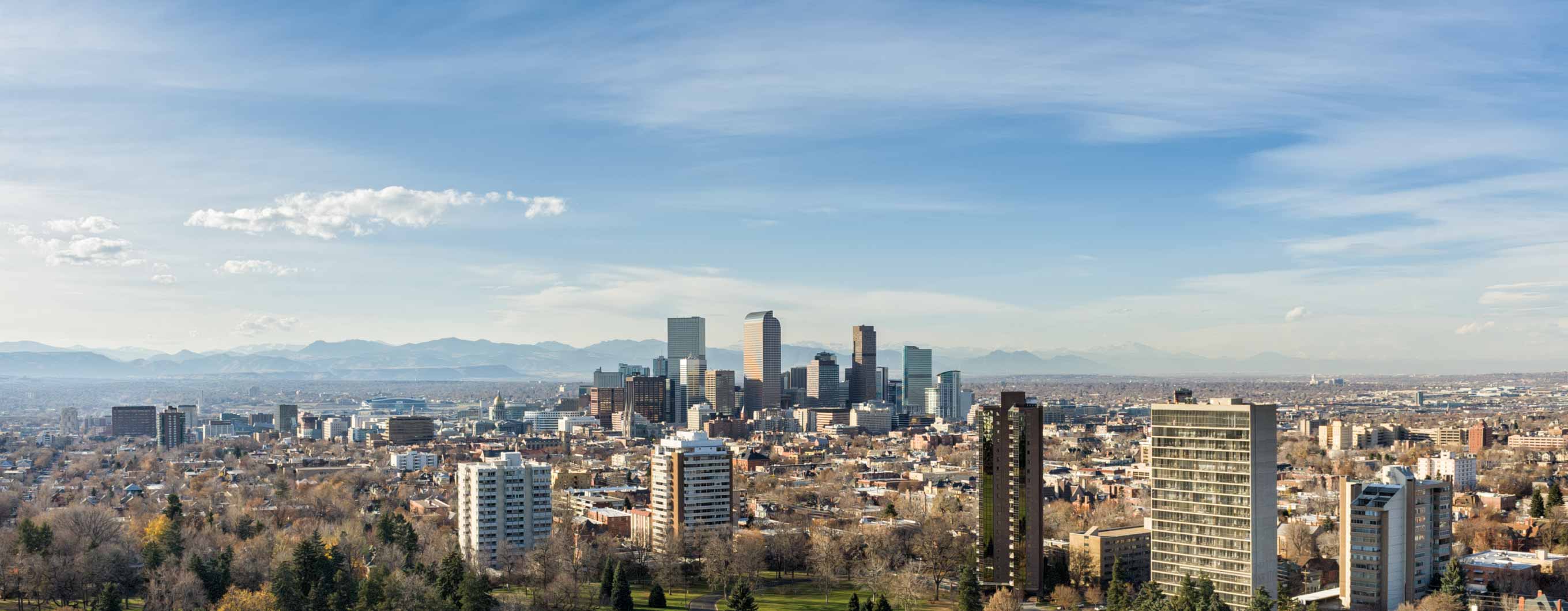
Home Insurance in Denver - Costs, Coverage & Local Tips
Living in Denver means 300 days of sunshine, access to killer green chile, and a serious relationship with your snow shovel. But whether you’re catching Rockies games downtown or hiking near Golden, one thing’s for sure: the Mile High City makes homeownership an adventure.
That’s why it helps to have homeowners insurance that’s prepared for the unexpected. Here’s what home insurance in Denver typically covers, how much it could cost, and how to find a policy that fits your needs.
How much is homeowners insurance in Denver?
Home insurance in Denver, CO rates are among the highest in the United States — likely due to the city’s history of hailstorms, heavy snow, power outages, and wildfire risk.
Here’s how Colorado’s average premiums have changed over the past five years:
Year | Average Annual Premium in Colorado* |
|---|---|
2024 | $4,465 |
2023 | $4,086 |
2022 | $3,376 |
2021 | $1,802 |
2020 | $1,667 |
What factors influence my home insurance rate?
Your Denver insurance quote isn’t pulled from thin air (even if the mountain wind makes it feel that way). Insurance companies may look at these factors to calculate your premium:
Location, location, location. Denver is no stranger to natural disasters—think hailstorms, blizzards, wildfires, and flash floods. Living near high-risk zones (or even within a certain ZIP code) could bump up your premium.
Your home’s age and condition. Older homes with outdated plumbing, electrical systems, or roofs could cost more to insure.
Rebuilding costs. Premiums reflect current local construction prices, which could cause your premium to increase if estimated costs are higher in your area.
Roof type and condition. Hail-resistant roofing materials could reduce your rate.
Your claims history. Multiple past claims (even from previous owners) could flag your home as higher risk.
Credit score. Colorado insurers are allowed to use your credit-based insurance score to help set your rate.
Deductible amount. Choosing a higher home insurance deductible could lower your premium, but only choose it if you could comfortably cover it in an emergency.
Common insurance discounts in Denver
Some insurers may offer discounts to help reduce your Denver homeowners insurance premium:
- Bundle and save. Combining your home and auto insurance with the same company could result in discounts to your insurance premium.
- New home discount. Updated construction or homes with major renovations could qualify for lower rates.
- Claims-free discount. Not filing claims over time may help reduce your costs.
- Protective devices. Smoke alarms, water sensors, and security systems may unlock discounts.
- Roof upgrade discount. With hailstorms a regular event in Denver, insurers could reward hail-resistant materials with discounts.
- Loyalty rewards. Some insurers might offer lower rates to long-time customers as a thanks for sticking with them. It’s worth asking about.
Tip: Not every home insurance discount is automatically applied, so when you're comparing home insurance quotes in Denver, don’t be afraid to ask your provider, “Is that the best rate I qualify for?”
What does home insurance in Denver cover?
Standard homeowners insurance in Denver, CO (and other places) is called an HO-3 policy. These policies could contain several types of coverages that work in unison to protect you.
For example, it may include dwelling coverage to repair or rebuild your home if it's damaged by covered events (like hail, wind, fire, or lightning). This coverage could also protect other structures like garages, sheds, and fences—even your backyard sauna, if that’s your thing.
Denver home insurance also could include personal property coverage for things like your Peloton, couch, or kitchen gadgets (up to your policy’s limit, of course).
Plus, you might get liability protection if someone gets hurt on your property—say, slipping on your icy front steps.
And if a covered event forces you out, loss of use coverage could help cover hotel stays and meals while your home gets back to livable condition.
Similar reading: 8 types of homeowners insurance you need to know
Additional Denver insurance coverage options
Since standard home insurance doesn’t cover everything, you might want to consider these riders or add-ons:
- Flood insurance. If you're near the Platte River or a low-lying part of town in a flood zone, you could need this type of insurance. Standard home insurance doesn’t include it.
- Sewer backup coverage. Denver storms can overwhelm drains fast. This coverage could help with clean-up and repair.
- Scheduled personal property. Got a mountain bike worth more than your first car? Or ski gear that’s basically custom-fit? You could need to schedule high-value items separately to get the full replacement cost.
- Extended replacement cost. If construction prices rise fast in Colorado, this add-on could provide extra funds for rebuilding costs that go beyond your dwelling limit.
- Wildfire insurance. This add-on may offer added protection in dry, wildfire-prone areas near Denver.
What Denver residents need to know
Living in Denver means expecting the unexpected. One day, it’s blue skies over Cheesman Park, and the next a surprise hailstorm is cracking windshields across Capitol Hill. That’s just life in the Mile High City—and it’s exactly why having the right amount of home insurance matters.
First, know that Denver ranks among the most hail-prone cities in the country, with four billion-dollar storms striking since 2017. If your roof isn’t built to withstand that kind of impact, consider looking into comprehensive coverage.
Then there’s the rising risk of extreme heat and wildfires. Nearly every home in Denver faces at least moderate heat risk. And with drier summers and wildfire zones creeping closer to the metro, check if your insurance policy accounts for both.
Check out these home insurance tips before you buy a policy.
How to lower your Denver home insurance premium
Between high rebuild costs and hail risk, home insurance in Denver, CO isn’t exactly cheap. Here are a few ways to potentially save:
- Shop around. Get quotes from at least three providers or agents to find competitive pricing. Pro Tip: Use the Colorado Department of Regulatory Agencies’s homeowners insurance premiums report to look up various home insurance companies and how much they charge on average for insurance in Denver.
- Raise your deductible. If you can afford a bit more out of pocket in an emergency, choosing a higher deductible can lower your monthly costs.
- Stay claims-free. You could also try avoiding small claims when possible. A clean claims history could lead to lower rates over time.
Looking for homeowners insurance in a different Colorado city?
If you're browsing coverage options outside the Mile High City, check out these Colorado guides.
- Heading south? Check out home insurance in Colorado Springs.
- Want the big picture? Our Colorado home insurance guide breaks down costs, risks, and coverage across the state.
- Renting out your property? Our Colorado landlord insurance page could be worth exploring.
Still have questions?
Homeowners insurance in Denver can feel like a lot, especially when you're balancing costs, coverage, and unpredictable weather. Here are answers to a few common questions to help you feel more confident about insuring your home.
Is wildfire damage covered by standard homeowners insurance in Denver, Colorado?
In many cases, yes—standard HO-3 homeowners insurance policies could cover damage from wildfires. But since Colorado's wildfire risk is increasing, especially in areas near the wildland-urban interface, it’s worth double-checking your policy limits. You’ll want to make sure your dwelling coverage is high enough to fully rebuild your home and that your personal property and loss-of-use coverage reflect current costs. If you’re unsure, ask your insurer about additional wildfire-specific protections or add-ons.
How do I file a claim with Hippo in Denver, Colorado?
If you’re a Hippo customer in Denver and need to file a claim, you can do so online or by phone. Log into your Hippo account at hippo.com or call the claims number listed on your policy documents to get started. Hippo's claims team will guide you through the next steps, like documenting damage and arranging inspections. If it's safe, snapping photos or videos early can help support your claim.
How much is condo insurance in Denver?
Condo insurance in Denver averages around $800 per year, according to Insurance.com. It’s much cheaper than home insurance in Denver because policies typically cover personal property, liability, and interior damage not included in your HOA’s master policy.
How much is renters insurance in Denver?
Renters insurance in Denver costs around $18 a month or $216 a year, according to data from Insure.com. Renters insurance is an HO-4 policy that typically covers your personal property, liability, and additional living expenses.
*Data retrieved from Insurance.com, Insure.com, and III.org. This table represents average home insurance rates for Colorado as a whole. Your home insurance quotes in Denver may vary.



